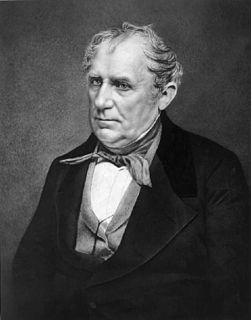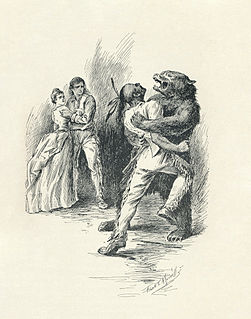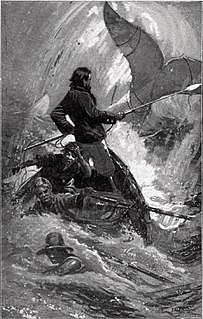
James Fenimore Cooper was an American writer of the first half of the 19th century, whose historical romances depicting colonist and Indigenous characters from the 17th to the 19th centuries brought him fame and fortune. He lived much of his boyhood and the last fifteen years of life in Cooperstown, New York, which was founded by his father William Cooper on property that he owned. Cooper became a member of the Episcopal Church shortly before his death and contributed generously to it. He attended Yale University for three years, where he was a member of the Linonian Society.

The Last of the Mohicans: A Narrative of 1757 is a historical romance written by James Fenimore Cooper in 1826.

William Cooper was an American merchant, land speculator and developer, the founder of Cooperstown, New York. A politician, he was appointed as a county judge and later served two terms in the United States Congress, representing Otsego County and central New York. He was the father of James Fenimore Cooper, who became a noted writer of historical novels related to the New York frontier.

The Leatherstocking Tales is a series of five novels by American writer James Fenimore Cooper, set in the eighteenth-century era of development in the primarily former Iroquois areas in central New York. Each novel features Natty Bumppo, a frontiersman known to European-American settlers as "Leatherstocking", "The Pathfinder", and "the trapper". Native Americans call him "Deerslayer", "La Longue Carabine", and "Hawkeye".

The Pilot: A Tale of the Sea is a historical novel by James Fenimore Cooper, first published in January 1824. Its subject is the life of a naval pilot during the American Revolution. It is often considered the earliest example of nautical fiction in American literature.

Precaution (1820) is the first novel by American author James Fenimore Cooper.
USS Fenimore Cooper (1853) was a United States Navy schooner assigned as a ship’s tender to accompany a surveying expedition. After departing from Hampton Roads, Virginia, and navigating the Cape of Good Hope, the expedition traveled throughout the Pacific Ocean accumulating hydrographic information from the South China Sea to the Bering Strait in the Arctic and Alaska.
Paul Fenimore Cooper was an American writer of children's books and non-fiction, some based on his travels. His first book was a translation of Albanian folk tales.

The Bravo is a novel by James Fenimore Cooper first published in 1831 in two volumes. Inspired by a trip to Europe where he traveled through much of Italy, the novel is set in Venice. The Bravo is the first of Cooper's three novels to be set in Europe. This group of three novels, which one critic would call Cooper's "European trilogy", include The Heidenmauer and The Headsman. Like his other novels set in Europe, The Bravo was not very well received in the United States. The book largely focuses on political themes, especially the tension between the social elite and other classes.
The Chainbearer; or The Littlepage Manuscripts is a novel by the American novelist James Fenimore Cooper first published in 1845. The Chainbearer is the second book in a trilogy starting with Satanstoe and ending with The Redskins. The novel focuses mainly on issues of land ownership and the displacement of American Indians as the United States moves Westward.
Jack Tier, or the Florida Reef is a novel by James Fenimore Cooper first published in 1848 by New York publisher Burgess, Stringer & Co. Set during the Mexican–American War, the novel relates a twenty-year homosocial relationship verging on the homoerotic between a sailor and the captain of the boat. But by the end of the novel the sailor is the captain's wife, transforming the story into one of heterosexual love and passion.

The Spy: a Tale of the Neutral Ground is a novel by American writer James Fenimore Cooper. His second novel, it was published in 1821 by Wiley & Halsted. The plot is set during the American Revolution and was inspired in part by the family friend John Jay. The Spy was successful and began Cooper's reputation as a popular and important American writer.

Nautical fiction, frequently also naval fiction, sea fiction, naval adventure fiction or maritime fiction, is a genre of literature with a setting on or near the sea, that focuses on the human relationship to the sea and sea voyages and highlights nautical culture in these environments. The settings of nautical fiction vary greatly, including merchant ships, liners, naval ships, fishing vessels, life boats, etc., along with sea ports and fishing villages. When describing nautical fiction, scholars most frequently refer to novels, novellas, and short stories, sometimes under the name of sea novels or sea stories. These works are sometimes adapted for the theatre, film and television.
Afloat and Ashore is a nautical fiction novel by James Fenimore Cooper first published in 1844. Set in 1796-1804, the novel follows the maritime adventures of Miles Wallingford Jr., the son of wealthy New York landowners who chooses to go to sea after the death of his parents. The novel ends abruptly part way through, and is followed by what critic Harold D. Langely called a "necessary" sequel Miles Wallingford, which resolves many thematic and plot elements. The novel is partially autobiographical, in part by Cooper's own experiences as a sailor, and is his first full-length novel to fully employ a first-person narrative.

Mercedes of Castile; or, The Voyage to Cathay is an 1840 historical novel by James Fenimore Cooper. The novel is set in 15th-century Europe, and follows the preparations and expedition of Christopher Columbus westward to the new world.
The Water-Witch is an 1830 novel by James Fenimore Cooper. Set in 17th-century New York and the surrounding sea, the novel depicts the abduction of a woman, Alida de Barbérie, by the pirate captain of the brigantine Water-Witch, and the subsequent pursuit of that elusive ship by her suitor, Captain Ludlow.
Satanstoe is an 1845 novel by the early American novelist James Fenimore Cooper. The novel, sometimes listed with the alternate title The Family of Littlepage or The Littlepage Manuscripts, is the first of a three novel cycle, followed by The Chainbearer and The Redskins. The novel is a fictional autobiography which explores the 18th century colony of New York.
The Two Admirals is an 1842 nautical fiction novel by American author James Fenimore Cooper. The novel was written after the Leatherstocking Tales novel The Deerslayer. Set during the 18th century and exploring the British Royal Navy, Cooper wrote the novel out of encouragement of his English publisher, who recommended writing another sea novel. Cooper had originally intended to write a novel where ships were the main characters, though eventually decided not to. The novels is one of three novels which Cooper would revise for editions following their first printing, the other two being The Pathfinder and Deerslayer.
Wyandotté is a historical novel published by James Fenimore Cooper in 1843. The novel is set in New York state during the American Revolution. The main character of the novel is an Indian, "Saucy Nick", also called Wyandotté, whose depictions violate stereotypes of Native Americans.

The Oak Openings; or, The Bee Hunter is an 1848 novel by James Fenimore Cooper. The novel focuses on the activities of professional honey-hunter Benjamin Boden, nicknamed "Ben Buzz". The novel is set in Kalamazoo, Michigan's Oak Opening, a wooded prairie that still exists in part today, during the War of 1812.










